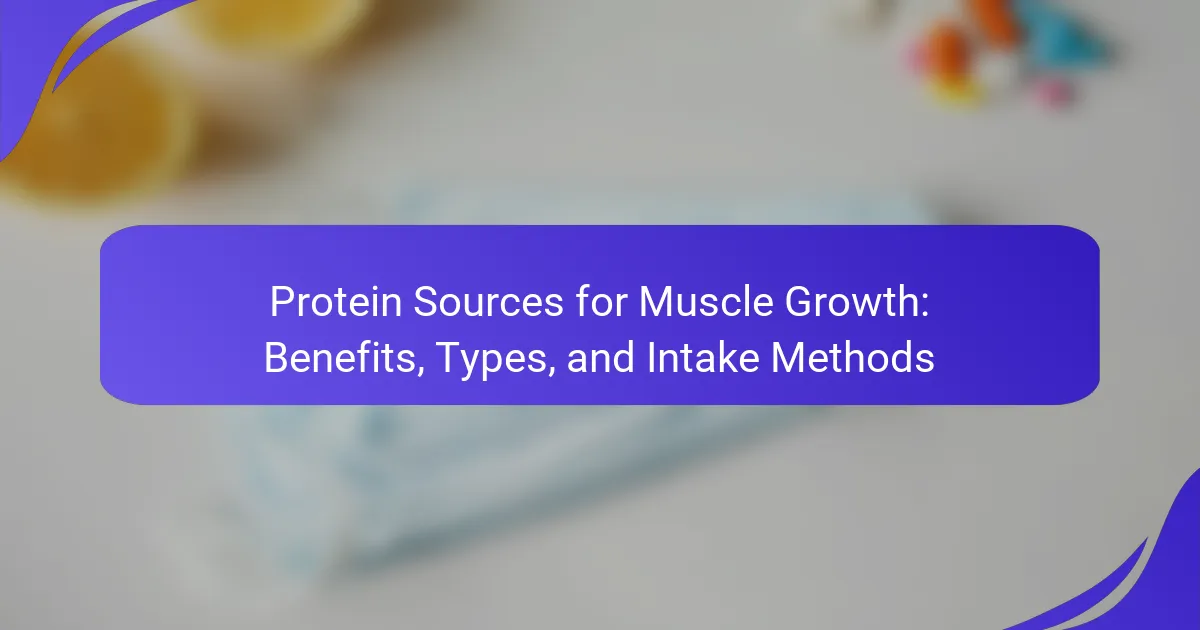Protein sources are crucial for muscle growth, providing essential amino acids for repair and development. This article explores the benefits of protein, various types including animal and plant-based options, and effective intake methods to optimize muscle recovery and growth. Understanding the unique attributes of different proteins can enhance workout performance and overall strength. Prioritizing high-quality protein and proper timing is key to achieving optimal results.

What are the key benefits of protein sources for muscle growth?
Protein sources are essential for muscle growth as they provide amino acids necessary for muscle repair and development. Key benefits include enhanced muscle recovery, increased muscle mass, improved strength, and better workout performance.
Quality protein sources, such as lean meats, dairy, legumes, and plant-based proteins, offer varying levels of essential amino acids. For example, whey protein is a complete protein with a high biological value, making it effective for muscle synthesis.
Intake methods, including whole food consumption and protein supplements, can optimize muscle growth. Consuming protein shortly after workouts can further support recovery and muscle adaptation.
In summary, the benefits of protein sources for muscle growth are significant, with various types and intake methods available to enhance results.
How does protein intake support muscle recovery?
Protein intake significantly enhances muscle recovery by supplying essential amino acids that repair and rebuild muscle fibers. Consuming high-quality protein sources, such as whey, casein, or plant-based proteins, optimizes recovery time post-exercise. Research indicates that a protein intake of 20-25 grams after workouts can stimulate muscle protein synthesis effectively. Unique attributes of protein types, such as the rapid absorption of whey compared to the slow release of casein, further influence recovery outcomes. Additionally, incorporating protein into meals throughout the day supports sustained muscle repair and growth.
What role does protein play in muscle synthesis?
Protein is essential for muscle synthesis as it provides the building blocks necessary for muscle repair and growth. It stimulates muscle protein synthesis, enhancing recovery after exercise. High-quality protein sources like lean meats, dairy, and legumes contain essential amino acids, which are crucial for optimal muscle development. Consuming protein shortly after workouts can significantly improve muscle recovery and growth rates.

What types of protein sources are most effective for muscle growth?
Protein sources that are most effective for muscle growth include animal-based options like whey, casein, and lean meats, as well as plant-based sources such as soy and pea protein. Whey protein is known for its rapid absorption, providing essential amino acids quickly after workouts. Casein, on the other hand, digests slowly, offering a steady release of amino acids, making it ideal for overnight recovery. Lean meats supply high-quality protein and important nutrients like iron and zinc. Plant-based proteins like soy and pea are excellent alternatives, providing comparable amino acid profiles. Combining different protein sources can optimize muscle growth by ensuring a complete amino acid intake.
What are the differences between animal and plant-based protein sources?
Animal and plant-based protein sources differ in their amino acid profiles, digestibility, and nutrient content. Animal proteins, such as meat and dairy, provide complete proteins with all essential amino acids and higher bioavailability. Plant proteins, like legumes and nuts, often lack one or more essential amino acids but offer fiber and antioxidants. Balancing both sources can optimize muscle growth and overall health.
Which animal-based proteins are best for muscle growth?
Animal-based proteins that are best for muscle growth include chicken, beef, fish, eggs, and dairy products. These sources provide essential amino acids necessary for muscle repair and growth.
Chicken breast is a lean protein, offering approximately 31 grams of protein per 100 grams. Beef is rich in iron and creatine, supporting muscle performance. Fish, especially salmon, provides omega-3 fatty acids, promoting recovery. Eggs contain high-quality protein and vitamins, aiding in muscle synthesis. Dairy products, like Greek yogurt, offer both protein and calcium, beneficial for muscle function.
Incorporating these proteins into a balanced diet can enhance muscle growth effectively.
What plant-based proteins are effective for muscle building?
Effective plant-based proteins for muscle building include quinoa, lentils, chickpeas, and hemp seeds. These sources provide essential amino acids, promote muscle recovery, and support overall health. Quinoa offers a complete protein profile with 8 grams per cup, while lentils provide 18 grams per cup, making them excellent choices. Chickpeas and hemp seeds also contribute significant protein content, enhancing muscle growth when included in a balanced diet.
How do protein powders compare to whole food sources?
Protein powders offer convenience and targeted nutrient profiles, while whole food sources provide additional vitamins and minerals. Whole foods typically contain fiber and antioxidants, enhancing overall health. Protein powders are easily digestible and can be quickly absorbed, making them ideal post-workout. Whole foods require more preparation time but contribute to a balanced diet. Ultimately, both can support muscle growth, but a combination of both is often recommended for optimal results.

What are the unique attributes of specific protein sources?
Unique attributes of specific protein sources include amino acid profiles, digestibility rates, and nutrient density. For instance, whey protein has a high leucine content, which is crucial for muscle protein synthesis. Plant-based proteins like quinoa offer a complete amino acid profile, which is rare among non-animal sources. Additionally, casein protein digests slowly, providing a sustained release of amino acids, beneficial for muscle recovery overnight. Each protein source’s unique attributes can influence their effectiveness for muscle growth and recovery.
What are the advantages of whey protein for muscle growth?
Whey protein supports muscle growth by providing essential amino acids rapidly. It enhances muscle protein synthesis, aids recovery, and reduces muscle breakdown. Its unique attribute is a high leucine content, which stimulates muscle growth effectively. Regular intake can lead to improved strength and body composition.
How does casein protein benefit muscle recovery?
Casein protein enhances muscle recovery by providing a slow and steady release of amino acids. This prolonged delivery helps repair muscle tissue and reduces muscle soreness after intense workouts.
Research indicates that casein can lead to greater muscle protein synthesis compared to other protein sources, particularly when consumed before sleep. This unique attribute of casein makes it ideal for overnight recovery, ensuring muscles receive nutrients during rest.
Incorporating casein protein into a post-workout routine can improve recovery times and support muscle growth, making it a valuable addition to any athlete’s diet.
What makes soy protein a unique choice for athletes?
Soy protein is a unique choice for athletes due to its complete amino acid profile and plant-based origin. It provides essential nutrients that support muscle recovery and growth. Additionally, soy protein contains isoflavones, which may help reduce inflammation and improve heart health. Its digestibility and versatility make it easy to incorporate into various diets, enhancing overall protein intake for optimal athletic performance.

What are some rare protein sources that can aid muscle growth?
Rare protein sources that can aid muscle growth include insects, algae, and certain plant-based options like hemp seeds. These sources offer unique amino acid profiles and additional nutrients. Insects, for instance, provide high protein content and are rich in omega-3 fatty acids. Algae, such as spirulina, contains all essential amino acids and is also a source of antioxidants. Hemp seeds are notable for their complete protein and healthy fats, making them a versatile addition to diets focused on muscle growth.
How can insect protein contribute to muscle development?
Insect protein significantly contributes to muscle development due to its high-quality amino acid profile. It contains essential amino acids, including leucine, which plays a crucial role in muscle protein synthesis. Additionally, insect protein is highly digestible, with a biological value comparable to traditional protein sources like whey. As a result, incorporating insect protein can enhance recovery and growth in muscle tissues. Furthermore, insects provide a sustainable protein source, making them an environmentally friendly alternative.
What benefits do lesser-known protein sources like hemp provide?
Lesser-known protein sources like hemp provide numerous benefits for muscle growth, including high protein content and essential fatty acids. Hemp protein contains all nine essential amino acids, making it a complete protein. It is also rich in omega-3 and omega-6 fatty acids, which support muscle recovery and overall health. Additionally, hemp is easily digestible, allowing for better nutrient absorption. Its unique attribute is the presence of edestin, a globulin protein that enhances immune function.

What are the best methods for protein intake to maximize muscle growth?
To maximize muscle growth, prioritize high-quality protein sources and effective intake methods. Focus on animal-based proteins like chicken, beef, and fish, which offer complete amino acids. Plant-based options such as lentils and quinoa can supplement intake, especially for vegetarians. Consuming protein within 30 minutes post-workout enhances muscle recovery and growth. Aim for 1.6 to 2.2 grams of protein per kilogram of body weight daily for optimal results.
How much protein should be consumed per meal for optimal results?
For optimal results, consume 20-30 grams of protein per meal. This amount supports muscle protein synthesis effectively. Research indicates that spreading protein intake evenly throughout the day enhances muscle growth. For instance, individuals engaging in resistance training benefit from this distribution.
What timing strategies enhance protein effectiveness around workouts?
Consuming protein strategically around workouts enhances its effectiveness for muscle growth. Pre-workout intake boosts amino acid availability, while post-workout consumption aids recovery and muscle repair. Aim for protein sources like whey or casein for rapid absorption. Timing protein intake within 30 minutes post-exercise maximizes muscle protein synthesis, leveraging the body’s heightened sensitivity to nutrients.

What common mistakes should be avoided when selecting protein sources?
Common mistakes to avoid when selecting protein sources include prioritizing low-quality options, overlooking amino acid profiles, and neglecting dietary preferences. Choosing protein sources based solely on cost can compromise muscle growth due to inadequate nutrient density. Additionally, failing to consider the complete amino acid profile may hinder recovery and muscle synthesis. It’s important to integrate a variety of protein types, such as animal and plant sources, to meet nutritional needs effectively.
How can over-reliance on protein supplements hinder muscle growth?
Over-reliance on protein supplements can hinder muscle growth by limiting nutrient diversity. Whole food sources provide vitamins, minerals, and fiber essential for optimal muscle development. Excessive protein intake from supplements may also lead to digestive issues and nutrient imbalances. As a result, focusing solely on protein powders can impede overall health and performance.
What are the signs of inadequate protein intake in a diet?
Signs of inadequate protein intake include muscle weakness, fatigue, and slow recovery from exercise. Individuals may also experience increased hunger, hair loss, and weakened immune function. These symptoms indicate insufficient protein, which is crucial for muscle repair and growth. A balanced diet rich in diverse protein sources, such as lean meats, dairy, legumes, and nuts, helps meet protein needs effectively.

What expert tips can enhance protein intake for muscle growth?
To enhance protein intake for muscle growth, focus on diverse protein sources and optimal consumption timing. Prioritize high-quality proteins such as lean meats, dairy, legumes, and plant-based options. Aim for 1.6 to 2.2 grams of protein per kilogram of body weight daily. Incorporate protein-rich snacks post-workout to maximize muscle recovery. Consider protein supplements like whey or plant-based powders for convenience.
How can meal planning improve protein consumption efficiency?
Meal planning enhances protein consumption efficiency by ensuring balanced intake throughout the day. It allows for precise tracking of protein sources, helping to meet muscle growth goals. By organizing meals, individuals can prioritize high-quality proteins such as lean meats, dairy, legumes, and plant-based options. This structured approach minimizes the risk of protein deficiency and promotes optimal recovery and muscle synthesis. Additionally, meal planning can reduce food waste, ensuring that protein-rich foods are consumed before expiration.
What are the best practices for combining protein sources for optimal results?
Combining protein sources enhances muscle growth by providing a complete amino acid profile. Aim to mix animal-based proteins, like chicken or fish, with plant-based sources, such as beans or quinoa. This combination maximizes the intake of essential amino acids, promoting better muscle repair and growth. For example, pairing rice with black beans offers a balanced amino acid composition. Prioritize protein intake post-workout for optimal recovery.



